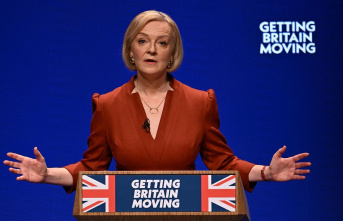The Federal Cabinet has initiated the continued operation of the remaining three nuclear power plants until April 15th. On Wednesday in Berlin, the ministers approved the necessary amendment to the Atomic Energy Act in "a maximum of four minutes", as Federal Economics Minister Robert Habeck (Greens) said afterwards. Environment Minister Steffi Lemke (also Greens) said: "There was no discussion of the bill."
Now it is the Bundestag's turn, which could agree in the second week of November. The Federal Council could deal with the plans at a special meeting at the end of November or a little earlier.
In particular, the Greens and the FDP had gotten caught up in arguments lasting for days about how to proceed with the German nuclear power plants, until Chancellor Olaf Scholz spoke a word of power on Monday. The SPD politician used his policy competence and instructed the responsible ministers to make legislative proposals so that the Isar 2, Neckarwestheim 2 and Emsland nuclear power plants can continue to operate beyond the end of the year until April 15, 2023. Actually, the three nuclear power plants should have gone off the grid on December 31 of this year.
Stability of supply in focus
The draft law allows the power plants to "make a certain contribution to the stability of the power supply in Germany" until mid-April, said Lemke. "After that, this permission ends permanently." The permit for continued operation only applies to the fuel elements still in the plants. "That is also laid down in the draft law."
Habeck emphasized that this ruled out the use of the power plants in the winter of next year. "I am firmly assuming that the FDP is faithful to the treaty and will not damage the authority of the Federal Chancellor," he said of possible Liberal hopes for a more extensive use of nuclear power in Germany.
Due to the time delay of the last few weeks and months, the operational reserve he proposed, which provided for the further use of the nuclear power plants only after a needs assessment, was no longer possible, said Habeck. That is why the stretching operation is now planned, i.e. continued operation beyond the turn of the year.
Habeck emphasized that he was "very confident that we will find a different situation" for the winter of 2023/24. He referred to the construction of floating import terminals for liquid gas in northern German ports. In the winter of next year, "a good part of the lost capacity of Nord Stream 1" will have been replaced, he said, referring to the German-Russian gas pipeline that has been put on hold.












